新概念2A复习提纲
新概念2A复习提纲
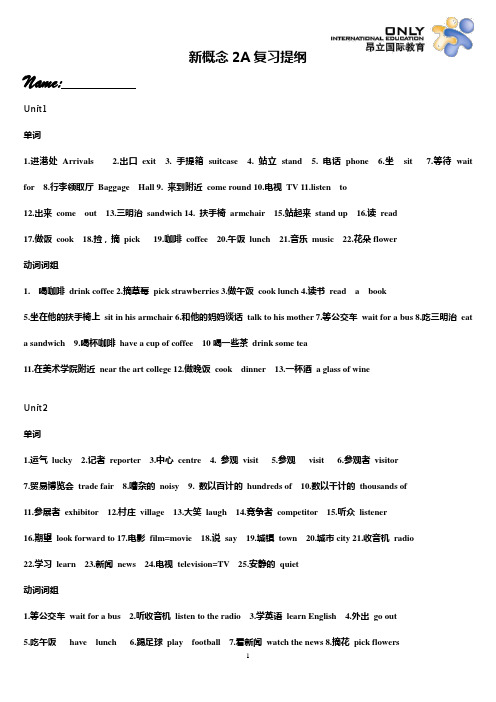
新概念2A复习提纲Name:Unit1单词1.进港处Arrivals2.出口exit3. 手提箱suitcase4. 站立stand5. 电话phone6.坐sit7.等待wait for8.行李领取厅Baggage Hall9. 来到附近come round 10.电视TV 11.listen to12.出来come out 13.三明治sandwich 14. 扶手椅armchair 15.站起来stand up 16.读read17.做饭cook 18.捡,摘pick 19.咖啡coffee 20.午饭lunch 21.音乐music 22.花朵flower动词词组1.喝咖啡drink coffee2.摘草莓pick strawberries3.做午饭cook lunch4.读书read a book5.坐在他的扶手椅上sit in his armchair6.和他的妈妈谈话talk to his mother7.等公交车wait for a bus8.吃三明治eat a sandwich9.喝杯咖啡have a cup of coffee 10喝一些茶drink some tea11.在美术学院附近near the art college 12.做晚饭cook dinner 13.一杯酒a glass of wineUnit2单词1.运气lucky2.记者reporter3.中心centre4. 参观visit5.参观visit6.参观者visitor7.贸易博览会trade fair 8.嘈杂的noisy 9. 数以百计的hundreds of 10.数以千计的thousands of11.参展者exhibitor 12.村庄village 13.大笑laugh 14.竞争者competitor 15.听众listener16.期望look forward to 17.电影film=movie 18.说say 19.城镇town 20.城市city 21.收音机radio22.学习learn 23.新闻news 24.电视television=TV 25.安静的quiet动词词组1.等公交车wait for a bus2.听收音机listen to the radio3.学英语learn English4.外出go out5.吃午饭have lunch6.踢足球play football7.看新闻watch the news8.摘花pick flowers9.看电视watch television=watch TV 10.回家come home关键句型1.这里有数以百计的参展者和数以千计的参观者。
新概念英语2A NEC 2A 复习大纲U1-U4

青少版新概念2A(Unit1-Unit4)月考复习大纲复习指引:1、听说读:每天跟读一篇课文,模仿语音语调,大声开口朗读不少于十分钟,对课文图片故事进行描述,能够根据课后的问题进行流利回答。
2、写:默写听写错误的单词,复习做错的题目,完成本次复习大纲的练习。
3、建议:重新检查前四周下发的补充资料和课后练习,重点复习知识盲点。
必考单词Unit1 ex_t 出口st_ _d 站立su_tc_s_手提箱,皮箱ph_ _ _ 电话s__t 坐考试题型:单词填空Unit 2 l__ck运气rep__ __t___ ___记者v__s___t参观n__ ___sy嘈杂的v__s__t__ __参观者s__ __说v__llage村庄l__ __gh大笑listen__ __听众f__l___电影c__t___城市t_ _ n 市镇sp_r_t本质,精神Unit3 your_ 你(们)的(所有物)str_ _ge 奇怪的n_t_ 便条p_cket 口袋,衣袋m_ne 我的b_long to 属于h_s 他的(所有物)airpor_ _t飞机场p_ck up 接b_ck 回原处Unit4 vol_ _teer自愿者h_ur小时h__ro英雄w__ lk走t__ke off脱下t__ rn on打开turn o__f关掉thr__ w aw__y扔掉p__t up挂起teke d__ wn拿下必考语法Unit1 现在分词的构成规则:1. 一般动词直接加-ing do-- doing; go—going。
2. 以辅音字母+ e 结尾的动词,去e 加-ing。
make—making; take—taking3. 以ie结尾的动词,把ie改成y, 再加-ing。
lie—lying; die--dying4. 以重读闭音节为末尾音节,且以单个辅音。
5. 字母结尾的动词,将词尾辅音字母双写,再加-ingrun—running; sit--sitting7. 以重度-r音节为末尾音节的动词,双写r,再加-ingprefer—preferring; refer—referring1.现在进行时:正在做什么动作或者是正在发生什事情。
新概念英语第二册复习资料
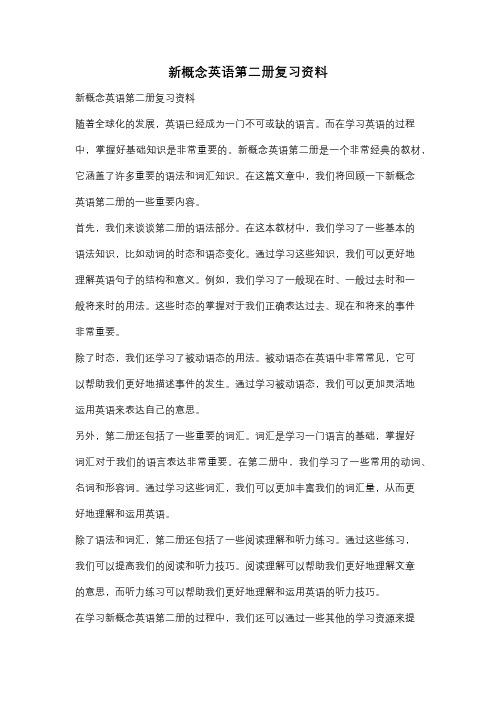
新概念英语第二册复习资料新概念英语第二册复习资料随着全球化的发展,英语已经成为一门不可或缺的语言。
而在学习英语的过程中,掌握好基础知识是非常重要的。
新概念英语第二册是一个非常经典的教材,它涵盖了许多重要的语法和词汇知识。
在这篇文章中,我们将回顾一下新概念英语第二册的一些重要内容。
首先,我们来谈谈第二册的语法部分。
在这本教材中,我们学习了一些基本的语法知识,比如动词的时态和语态变化。
通过学习这些知识,我们可以更好地理解英语句子的结构和意义。
例如,我们学习了一般现在时、一般过去时和一般将来时的用法。
这些时态的掌握对于我们正确表达过去、现在和将来的事件非常重要。
除了时态,我们还学习了被动语态的用法。
被动语态在英语中非常常见,它可以帮助我们更好地描述事件的发生。
通过学习被动语态,我们可以更加灵活地运用英语来表达自己的意思。
另外,第二册还包括了一些重要的词汇。
词汇是学习一门语言的基础,掌握好词汇对于我们的语言表达非常重要。
在第二册中,我们学习了一些常用的动词、名词和形容词。
通过学习这些词汇,我们可以更加丰富我们的词汇量,从而更好地理解和运用英语。
除了语法和词汇,第二册还包括了一些阅读理解和听力练习。
通过这些练习,我们可以提高我们的阅读和听力技巧。
阅读理解可以帮助我们更好地理解文章的意思,而听力练习可以帮助我们更好地理解和运用英语的听力技巧。
在学习新概念英语第二册的过程中,我们还可以通过一些其他的学习资源来提高我们的英语水平。
比如,我们可以通过听英语歌曲来提高我们的听力技巧和语感。
我们还可以通过阅读英语文章来提高我们的阅读理解能力。
此外,我们还可以通过参加英语角或者找一个英语学习伙伴来提高我们的口语表达能力。
总之,新概念英语第二册是一个非常重要的教材,它包含了许多重要的语法和词汇知识。
通过学习这本教材,我们可以提高我们的英语水平,更好地理解和运用英语。
除了教材本身,我们还可以通过其他的学习资源来提高我们的英语能力。
新概念青少版2A各单元重点归纳
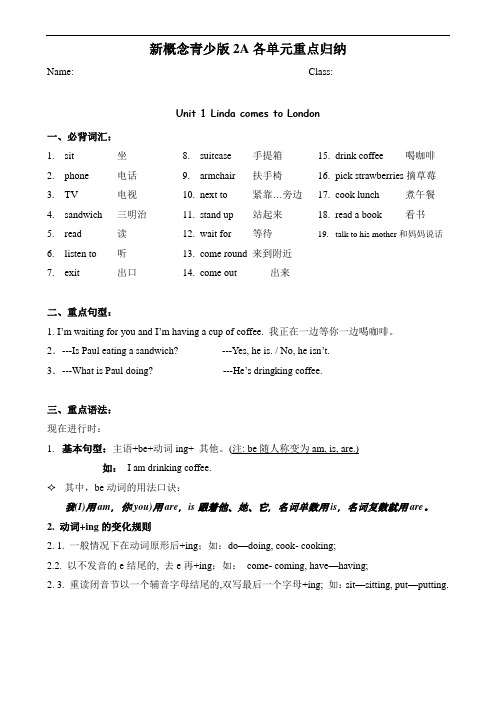
新概念青少版2A各单元重点归纳Name:___________________ Class:___________________Unit 1 Linda comes to London一、必背词汇:1.sit 坐2.phone 电话 电视4.sandwich 三明治5.read 读6.listen to 听7.exit 出口8.suitcase 手提箱9.armchair 扶手椅10.next to 紧靠…旁边11.stand up 站起来12.wait for 等待e round 来到附近e out 出来15.drink coffee 喝咖啡16.pick strawberries摘草莓17.cook lunch 煮午餐18.read a book 看书19.talk to his mother和妈妈说话二、重点句型:1. I’m waiting for you and I’m having a cup of coffee. 我正在一边等你一边喝咖啡。
2.---Is Paul eating a sandwich? ---Yes, he is. / No, he isn’t.3.---What is Paul doing? ---He’s dringking coffee.三、重点语法:现在进行时:1.基本句型:主语+be+动词ing+ 其他。
(注: be随人称变为am, is, are.)如:I am drinking coffee.其中,be动词的用法口诀:我(I)用am,你(you)用are,is跟着他、她、它,名词单数用is,名词复数就用are。
2. 动词+ing的变化规则2. 1. 一般情况下在动词原形后+ing;如:do—doing, cook- cooking;2.2. 以不发音的e结尾的, 去e再+ing;如:come- coming, have—having;2. 3. 重读闭音节以一个辅音字母结尾的,双写最后一个字母+ing; 如:sit—sitting, put—putting.Unit 2 Good luck on Sunday!一、重点词汇:1.visit 参观,访问2.visitor 参观者3.noisy 嘈杂的4.village 村庄ugh 大笑6.film 电影7.say 说话8.town 市镇,城镇9.city 城市10.radio 收音机11.learn 学习12.news 新闻13.quiet 安静的14.television 电视机15.luck 运气16.center 中心e home 回家18.listen to the radio听收音机19.learn English 学习英语20.watch the news 看新闻21.play football 踢足球22.have lunch 吃午餐23.go out 外出24.hundreds of 数以百计的25.thousands of 数以千计26.look forward to 盼望,期望二、重点句型:1. --- Are Robert and Lucy waiting for a taxi? 罗伯特和露西在等出租车么?---Yes, they are. / No, they aren’t.2. ---What are Robert and Lucy doing? 罗伯特和露西在做什么?--- They are waiting for a bus. 他们正在等公交车。
新概念英语2知识点全
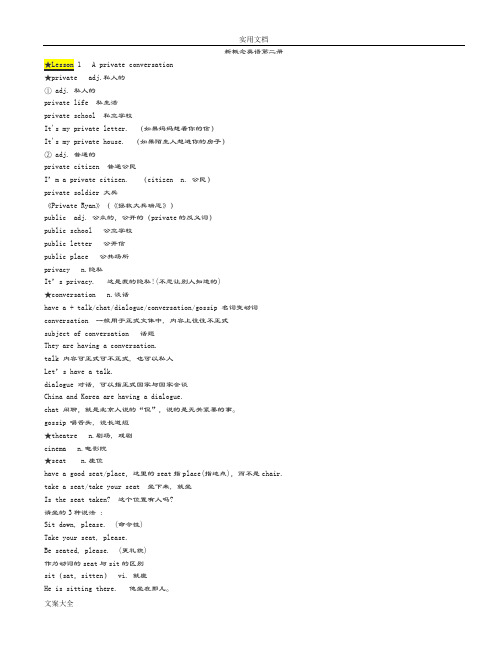
新概念英语第二册★private adj.私人的① adj. 私人的private life 私生活private school 私立学校It's my private letter. (如果妈妈想看你的信)It's my private house. (如果陌生人想进你的房子)② adj. 普通的private citizen 普通公民I’m a private citizen. (citizen n. 公民)private soldier 大兵《Private Ryan》(《拯救大兵瑞恩》)public adj. 公众的,公开的(private的反义词)public school 公立学校public letter 公开信public place 公共场所privacy n.隐私It’s privacy. 这是我的隐私!(不愿让别人知道的)★conversation n.谈话have a + talk/chat/dialogue/conversation/gossip 名词变动词conversation 一般用于正式文体中, 内容上往往不正式subject of conversation 话题They are having a conversation.talk 内容可正式可不正式, 也可以私人Let’s have a talk.dialogue 对话, 可以指正式国家与国家会谈China and Korea are having a dialogue.chat 闲聊,就是北京人说的“侃”,说的是无关紧要的事。
gossip 嚼舌头, 说长道短★theatre n.剧场, 戏剧cinema n.电影院★seat n.座位have a good seat/place,这里的seat指place(指地点),而不是chair. take a seat/take your seat 坐下来, 就坐Is the seat taken? 这个位置有人吗?请坐的3种说法 :Sit down, please. (命令性)Take your seat, please.Be seated, please. (更礼貌)作为动词的seat与sit的区别sit(sat,sitten) vi. 就座He is sitting there. 他坐在那儿。
新概念第二册学习大纲
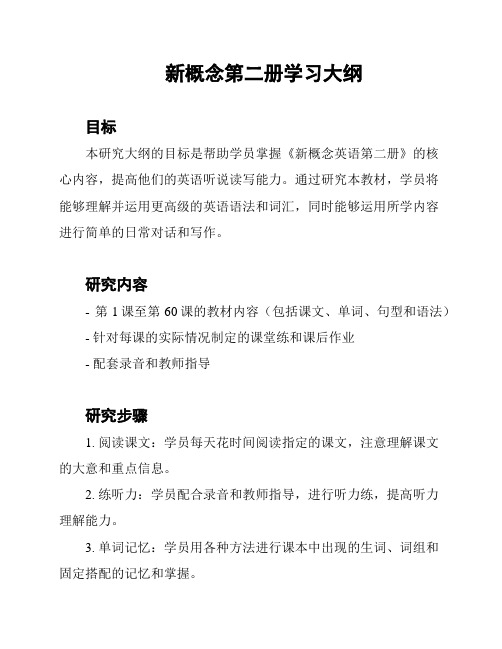
新概念第二册学习大纲目标本研究大纲的目标是帮助学员掌握《新概念英语第二册》的核心内容,提高他们的英语听说读写能力。
通过研究本教材,学员将能够理解并运用更高级的英语语法和词汇,同时能够运用所学内容进行简单的日常对话和写作。
研究内容- 第1课至第60课的教材内容(包括课文、单词、句型和语法)- 针对每课的实际情况制定的课堂练和课后作业- 配套录音和教师指导研究步骤1. 阅读课文:学员每天花时间阅读指定的课文,注意理解课文的大意和重点信息。
2. 练听力:学员配合录音和教师指导,进行听力练,提高听力理解能力。
3. 单词记忆:学员用各种方法进行课本中出现的生词、词组和固定搭配的记忆和掌握。
4. 语法研究:学员通过课本中的语法解释和例句进行语法研究,理解并掌握英语语法的基本规则。
5. 课堂练:学员参与课堂上针对每课内容的练,加深对所学知识的理解。
6. 课后作业:学员完成教师布置的课后作业,巩固所学内容。
7. 口语表达:学员进行口语练,模仿和使用教材中的句子和对话进行表达训练。
8. 阅读扩展:学员进行额外的阅读练,扩展词汇量和理解能力。
9. 写作练:学员进行书面表达的练,通过写作提升语言表达能力。
研究评估学员将通过以下方式进行研究评估:- 课堂上的口语和听力练- 课堂练和课后作业的完成情况和表现- 阅读和写作练的成果和进步- 定期的考试或测试研究时间安排根据学员的研究进度和具体情况,研究时间可以灵活安排。
建议学员每天至少花费1-2小时进行研究,保持良好的研究持续性和积累效应。
支持和辅导学员可以随时向教师或研究群组中的同学寻求帮助和支持。
教师将提供必要的辅导和指导,帮助学员克服研究难题并取得进步。
新概念英语第二册知识点

新概念英语第二册知识点新概念英语第二册是英语学习中的重要教材,对于提升英语综合能力有着显著的作用。
以下将为您详细介绍其中的一些重要知识点。
一、语法知识1、一般过去时这是第二册中频繁出现的时态。
用于表示过去某个特定时间发生的动作或存在的状态。
例如:“I went to the cinema yesterday” (我昨天去看电影了。
)需要注意动词的过去式变化规则,有规则变化(如:play played)和不规则变化(如:go went)。
2、过去进行时强调过去某个时刻正在进行的动作。
句子结构通常为“was/were +动词的现在分词”。
比如:“I was reading a book at eight o'clock last night” (昨晚八点我正在读书。
)3、现在完成时用来表示过去发生的动作对现在造成的影响或结果。
其构成是“have/has +过去分词”。
像:“I have already finished my homework”(我已经完成了作业。
)4、宾语从句在句子中充当宾语的从句叫宾语从句。
要注意宾语从句的语序要用陈述句语序。
例如:“He said that he would come” (他说他会来。
)5、直接引语和间接引语直接引用别人的话叫直接引语,用自己的话转述别人的话叫间接引语。
转换时要注意时态、人称和指示代词等的变化。
二、词汇积累1、常用动词短语如:look after(照顾)、put on(穿上)、take off(脱下)等,这些短语在日常表达中非常实用。
2、形容词和副词的比较级和最高级学习如何表达程度的差异,如:good better best,bad worse worst 等。
3、介词的用法掌握如 at、in、on 等介词在时间、地点表达上的不同用法。
三、课文理解1、理解文章主旨每篇课文都有其主题,通过阅读要能够抓住主要内容。
2、分析句子结构对于课文中的长难句,要学会分析其结构,理解句子成分。
新概念英语第二册lesson1-lesson3重要知识点复习

即学即用:
A (1)________ a clever boy he is !
A. What
B. How
C. What’s
(2)________delicious soup! B A. How B. What C. What a
A (3)________heavy snow!
一般的动词直接+ing
以e结尾的动词,去e,+ing
sit---sitting run---running swim---swimming put---putting lie---lying die---dying tie---tying
重读闭音节要双写结尾的 辅音字母加ing
以ie结尾的开音节词,改ie为 y再加ing
D. What an
( B )7.—That bag costs you 20 yuan. —________expensive it is! A. What C. What a B. How D. How a
( C )8.________beautiful music it is! A. What a B. What an
go there with you! A. What C. When B. How D. Why
考题回放
例1 ________big the tree is! A. What C. What a 答案 解析 结构。 B “How + 形容词/副词+主语+谓语” B. How D. How a
例2 ________good teachers they are! A. What C. How 答案 解析 A what修饰名词,单数可数名词前要加a / B. What a D. How a
新概念第二册复习知识点

新概念第二册复习知识点1. 介绍《新概念英语》是一套广受欢迎的英语教材系列,被广泛用于初学者的英语学习中。
第二册是该系列的第二本教材,主要讲解了一些基础的语法知识和词汇。
2. 重点语法2.1. 一般过去时一般过去时是用来描述过去发生的动作、事件或状态的。
它的构成是将动词的过去式形式直接加在主语后面。
例如: - I watched a movie last night.(我昨晚看了一部电影。
) - She cooked dinner yesterday.(她昨天做了晚饭。
)需要注意的是,有些动词的过去式形式并不是直接在原词的末尾添加-ed,而是有特殊的变化规则。
2.2. 疑问句和否定句在一般过去时中,构成疑问句和否定句的方式是将助动词“did”加在句子的开头。
例如: - Did you go to the party last night?(你昨晚去参加派对了吗?) - She didn’t like the movie.(她不喜欢那部电影。
)需要注意的是,在疑问句中,动词不再需要加-s或-es。
2.3. 频度副词频度副词用于描述动作发生的频率,一般放在行为动词之前。
例如: - I always go to the gym.(我总是去健身房。
) - He rarely eats fast food.(他很少吃快餐。
)常用的频度副词有always(总是)、usually(通常)、often(经常)、sometimes(有时候)、rarely(很少)和never(从不)等。
3. 重点词汇3.1. 家庭成员•father(父亲)•mother(母亲)•brother(兄弟)•sister(姐妹)•son(儿子)•daughter(女儿)3.2. 食品•apple(苹果)•banana(香蕉)•bread(面包)•cheese(奶酪)•chicken(鸡肉)•coffee(咖啡)•egg(鸡蛋)•fish(鱼肉)•rice(米饭)3.3. 动作•eat(吃)•drink(喝)•sleep(睡觉)•run(跑步)•swim(游泳)•study(学习)4. 练习题请用适当的动词形式填空:1.I _________ (watch) a movie last night.2.She __________ (cook) dinner yesterday.3.________ you _________ (go) to the party last night?4.He _________ (not like) the movie.5.I always ________ (go) to the gym.答案:1. watched 2. cooked 3. Did, go 4. didn’t like 5. go5. 总结本文回顾了《新概念英语》第二册的一些重点知识点,包括一般过去时的用法、疑问句和否定句的构成,以及一些常用的频度副词和词汇。
青少版新概念2A知识点 (1)

青少版新概念2A知识点 (1)
本文档旨在总结和记录《青少版新概念英语第二册A》课程的主要知识点。
以下是课程中的重点内容:
单词
- 单词的拼写和发音是研究英语的基础。
第二册A涵盖了一系列常用的单词,包括名词、动词和形容词等。
请确保掌握每个单词的意思、拼写和正确的发音。
句子构造
- 本册课程将帮助研究者构建简单的句子。
重点包括主谓宾结构、形容词和副词的使用,以及简单的否定和疑问句。
请在研究过程中多加练,并熟悉不同句子类型的表达方式。
语法
- 语法是建立正确句子的基础。
在本册课程中,我们将研究一些基本的语法规则,如一般现在时、一般过去时和现在进行时等。
请确保掌握这些基础知识,并能够正确运用于实际场景中。
阅读理解
- 阅读理解是提高英语水平的重要方面。
通过阅读并理解文章、故事和对话,研究者可以提升词汇量和阅读理解能力。
本册课程将
提供一系列适合青少年的阅读材料,帮助研究者培养阅读技巧。
口语表达
- 语言是用来交流的工具,口语表达能力是研究英语的重要目
标之一。
通过课程中的口语练和对话,研究者将提高自己的口语表
达能力,培养与他人交流的信心。
以上是《青少版新概念英语第二册A》课程的主要知识点总结。
希望通过这些内容的学习,学习者们能够掌握基本的英语语法和词汇,并提高自己的阅读理解和口语表达能力。
青少版新概念2A-Unit11教学提纲

Language points
• JACK: Anna, I want you to call Pierre in Paris. I’m going to Paris first thing (一 大早) tomorrow.
Travel
•Anna, she wanted to travel.
•set up •=plan
•straight •=right now
away
=at once
New words and expressions
trouble
n. 问题,麻烦事
set up
安排
sir
先生Leabharlann straight away adv. 立刻
安排
根据英语说出汉 语意思.
前天
旅行
上上星期
Listen to the tape again, and then choose T or F
• 1.Jack was in Paris yesterday. F
• 2.Jack wants to meet with Pierre at ten
o’clock. F • 3.Jack was in Paris the week before last.F
travel
V. 旅行
New words and expressions
last week
上星期
the week before last 上上星期
yesterday
昨天
the day before
前天
yesterday
the day after tomorrow 后天
新概念青少版2A各单元重点归纳

新概念青少版2A各单元重点归纳Name:___________________ Class:___________________Unit 1 Linda comes to London一、必背词汇:1.sit 坐2.phone 电话 电视4.sandwich 三明治5.read 读6.listen to 听7.exit 出口8.suitcase 手提箱9.armchair 扶手椅10.next to 紧靠…旁边11.stand up 站起来12.wait for 等待e round 来到附近e out 出来15.drink coffee 喝咖啡16.pick strawberries摘草莓17.cook lunch 煮午餐18.read a book 看书19.talk to his mother和妈妈说话二、重点句型:1. I’m waiting for you and I’m having a cup of coffee. 我正在一边等你一边喝咖啡。
2.---Is Paul eating a sandwich? ---Yes, he is. / No, he isn’t.3.---What is Paul doing? ---He’s dringking coffee.三、重点语法:现在进行时:1.基本句型:主语+be+动词ing+ 其他。
(注: be随人称变为am, is, are.)如:I am drinking coffee.其中,be动词的用法口诀:我(I)用am,你(you)用are,is跟着他、她、它,名词单数用is,名词复数就用are。
2. 动词+ing的变化规则2. 1. 一般情况下在动词原形后+ing;如:do—doing, cook- cooking;2.2. 以不发音的e结尾的, 去e再+ing;如:come- coming, have—having;2. 3. 重读闭音节以一个辅音字母结尾的,双写最后一个字母+ing; 如:sit—sitting, put—putting.Unit 2 Good luck on Sunday!一、重点词汇:1.visit 参观,访问2.visitor 参观者3.noisy 嘈杂的4.village 村庄ugh 大笑6.film 电影7.say 说话8.town 市镇,城镇9.city 城市10.radio 收音机11.learn 学习12.news 新闻13.quiet 安静的14.television 电视机15.luck 运气16.center 中心e home 回家18.listen to the radio听收音机19.learn English 学习英语20.watch the news 看新闻21.play football 踢足球22.have lunch 吃午餐23.go out 外出24.hundreds of 数以百计的25.thousands of 数以千计26.look forward to 盼望,期望二、重点句型:1. --- Are Robert and Lucy waiting for a taxi? 罗伯特和露西在等出租车么?---Yes, they are. / No, they aren’t.2. ---What are Robert and Lucy doing? 罗伯特和露西在做什么?--- They are waiting for a bus. 他们正在等公交车。
(完整word版)新概念英语2A新概念2A复习大纲--unit5--8
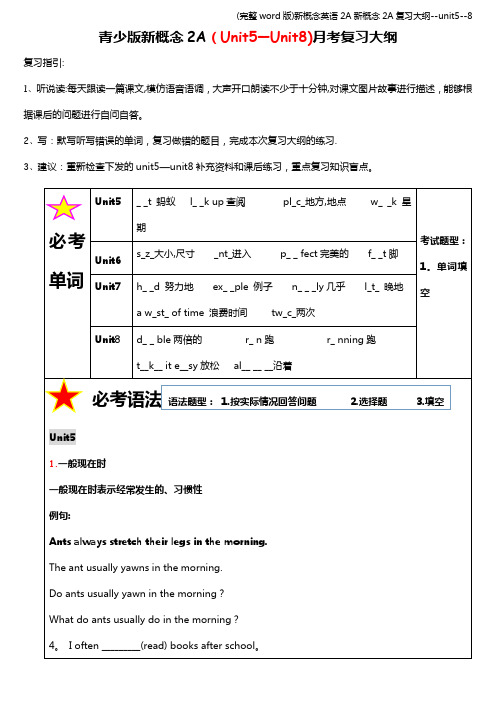
I have _________(hundred)of dreams。
3.I am going to______(leav____(be)going to______(go)shopping at the weekend。
5。My parents______(be) going to______(play)football next week。
(完整 word 版)新概念英语 2A 新概念 2A 复习大纲--unit5--8
青少版新概念 2A(Unit5—Unit8)月考复习大纲
复习指引: 1、听说读:每天跟读一篇课文,模仿语音语调,大声开口朗读不少于十分钟,对课文图片故事进行描述,能够根 据课后的问题进行自问自答。 2、写:默写听写错误的单词,复习做错的题目,完成本次复习大纲的练习. 3、建议:重新检查下发的 unit5—unit8 补充资料和课后练习,重点复习知识盲点。
补充对话
Part B: 听说读
1. 能够流利朗读 Unit5,Unit6,Unit7,Unit8,的课文故事.
2. 能够对课后问题进行回答(guided conversation)
人称变化用”is, am, are"来完成任务。"to"是尾巴杀手,它后面的动词必须是动词原形。
在肯定句中,主语+be (am / is / are) + going to +动词原形+其它。
Eg: I am going to work hard next year. 我明年打算努力学习。
在否定句中,必须在 be 的后面加 not eg: I am not going to play football. 我不打算踢足球.
6.Lily and Lucy ______(be)_______(dance)in the classroom now。
(完整word版)新概念青少版2A复习总结(语法)

新概念2A总复习Part 1 时态1、基本结构:be+doing (do代指所有动词原形)肯定句:主语+am/is/are+doing......My mother is talking with the dentist.否定句:主语+am/is/are not+doing...They aren’t playing games.一般疑问句:Is/Are+主语+doing...? Yes,主语+am/is/are...Is she waiting for a bus? No,主语+am/is/are not.特殊疑问句:特殊疑问词+is/are+主语+doing....?Where are they doing their homework?2、动词现在分词变化规则:1)一般情况下,直接在动词后加-ingwork ---- working sleep ----- sleeping study ----- studying2) 动词以不发音的-e结尾,要去-e加-ingtake ----- taking make ----- making dance ----- dancing3) 重读闭音节的动词,要双写词尾字母,再加-ingcut ----- cutting put ----- putting begin ------ beginning4) 以-ie结尾的动词,把变成y再加-inglie ----- lying tie ----- tying die ----- dying①表示客观事实、真理②经常发生、有规律的事情1、基本结构:①带有be动词: 主语+am/is/are+肯定句:主语+am/is/are+n./adj./prep.短语...The sky is blue.My music book is in the bag.否定句:主语+am/is/are not+n./adj./prep.短语...It isn’t my magazine.The curtain isn’t clean.一般疑问句:Is/Are+主语+n./adj./prep.短语...? Yes,主语+am/is/are.Are these gloves yours? No,主语+am/is/are not.Is there any water in the jug?特殊疑问句:特殊疑问词+is/are+主语+n./adj./prep.短语....?Which one is right?Who is the man in a black hat?②带有实义动词:主语+(never/sometimes/often/usually/always)v.原形/v.三单+....(every morning/day/week.)肯定句:主语+v.原形/三单+.......They usually live in dry places. It sometimes rains in summer. 否定句:主语+don’t /doesn’t +v.原形+....... We don’t go to school on weekends.一般疑问句:Do/Does+主语+v.原形.......? Yes,主语+do/does.Do you always arrive at school very early? No,主语+don’t/doesn’t. Does Lucy have a rest every afternoon?特殊疑问句:特殊疑问词+do/does+主语+v.原形.......?Why does she always arrive so late? 2、动词第三人陈单数变化规则: 1)一般直接在动词尾直接加 s.如: play —plays, want —wants, work —works,know —knows,help —helps, get —gets2)以字母s 、x 、ch 、sh 结尾的动词加-es guess—guesses,fix—fixes,teach—teaches,brush—brushes,watch—watches,catch—catches3)以辅音字母+y 结尾的动词,先变y 为i,再加-es.发音/z/如:study—studies,carry—carries,fly—flies,worry—worries1、学生们在干什么?有一些在打电话,另一些躺在沙滩上。
青少年新概念教学大纲新概念英语2A
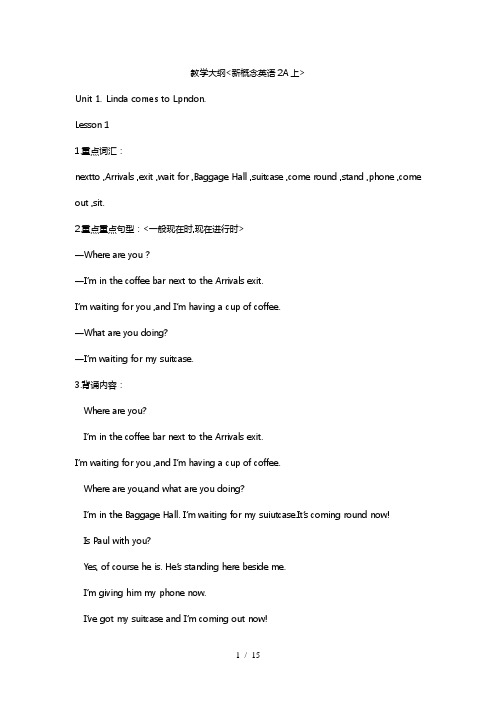
教学大纲<新概念英语2A上>Unit 1. Linda comes to Lpndon.Lesson 11.重点词汇:nextto ,Arrivals ,exit ,wait for ,Baggage Hall ,suitcase ,come round ,stand ,phone ,come out ,sit.2.重点重点句型:<一般现在时,现在进行时>—Where are you ?—I’m in the coffee bar next to the Arrivals exit.I’m waiting for you ,and I’m having a cup of coffee.—What are you doing?—I’m waiting for my suitcase.3.背诵内容:Where are you?I’m in the coffee bar next to the Arrivals exit.I’m waiting for you ,and I’m having a cup of coffee.Where are you,and what are you doing?I’m in the Baggage Hall. I’m waiting for my suiutcase.It’s coming round now!Is Paul with you?Yes, of course he is. He’s standing here beside me.I’m giving him my phone now.I’ve got my suitcase and I’m coming out now!Lesson 21.重点词汇:Sandwich, armchair, stand up, read, TV, listen to.2. 重点搭配:Drinking coffee, picking strawberries, cooking lunch, making cakes, sitting in his armchair, reading a book, talking to his mother, waiting for a bus3.语音:/I bring ring sing thingDrink rink sink think4.巩固练习:Patterns, March A and B, Sentence structure, Guided summary, Listening, Multiple choice.<学生自主完成每道练习后,教师讲解>Unit 2. Good luck on Sunday!Lesson3.1.重点词汇:Luck, reporter, centre, visit, trade fair, noisy, hundreds of, exhibitor, thousands of, visitor, village, laugh, competitor, listener, look forward to, spirit, film, say, town,city2.重点重点句型:We are visiting this year’s Marathon Expo. People are talking and laughing like old friends.+This is your first Marathon, isn’t it?—Yes, it is.Are you looking forward to Sunday/Yes, I am.That’s the spirit.3.背诵内容:课文前三幅插图所对应的内容Lesson 41.重点词汇:Radio, come home, learn, television, news, quiet.2.重点搭配:Waiting for a bus, listening to the radio, learning English, watching the news, playing football, having lunch, going out, going to the Trade Fair3.语音:|ai| a’’pply buy cry de’ny die fly lie re’ply|ai a’pplying ‘buying ‘crying de’nying ‘dying ‘flying ‘lying re’ply 4.巩固练习:Patterns. Sentence Table, Sentence structure, Guided summary, Listening, Multipul choice. <学生自主完成每道练习后,教师讲解>5.背诵内容:Lesson3的课文后三幅插图所对应的内容Unit 3. Is this yours?Lesson51.重点词汇:Yours, strange, note, pocket, mine, belong to, handwriting, his, ‘to-do’ list, airport, pick up, training run, back, why on earth、、、?2.点句型:What’s this note in my pocket/It isn’t mine.-Is it yours Daisy-No, it isn’t mine. Oh, it belongs to Paul.Why is it in my pocket?-Yes, it is Paul’s, isn’t it?-Yes. Why on earth is it in my pocket?3.背诵内容:课文后三幅插图所对应的内容Lesson 61.重点词汇:Hers, ours, theirs.2. 重点重点句型:This is my mobile. It’s mine. It belongs to me. These are your CDs. They’re yours. They belong to you. That is his book. It’s his. It belongs to him. Those are her gloves. They’re hers. They belong to her. This is our car. It’s ours. It’s ours. It belongs to us. That is their house. It’s theirs. It belongs to them.3.语音:|i| ‘bury ‘carry ‘tidy ‘hurry ‘study ‘worry|I‘burying ‘carrying ‘tidying ‘hurrying ‘studying ‘worrying4.巩固练习:Patterns, Sentence Table., Sentence structure, Guided summary, Listening, Crossword Puzzle. <学生自主完成每道练习后,教师讲解>5.背诵内容:Lesson5的课文后三幅插图所对应的内容Unit 4 The top three percen tLesson71.重点词汇:top three percent, volunteer, Congratulations! Hour, well done, foil jacket, put on, hero, walk, this way, medal2.重点重点句型:Congratulations! That’s fantastic! Well done!-How are you feeling?-I’m OK. Thanks.Walk this way. Pick up your medal. It’s yours! You’re in the top three percent!3.背诵内容课文前三幅插图所对应的内容Lesson81.重点词汇:Take off, turn on, turn off, letter, throw away, put up, curtain, take down, picture, sopleased, best wishes.2.重点重点句型:-What’s he doing?-He’s putting on his gloves.-Is he taking off his gloves?-No, he isn’t. He’s putting them on.-Don’t take your gloves off.-I’m not taking them off! I’m putting them on!-Can you put on your gloves, please?-Yes, of course.3.语音:|t| tin top boat meet ‘putting ‘pretty|d| day desk ride side ‘cloudy i’dea| | thank thin both tooth ath’letics ‘something| | then they ‘brother ‘other4.巩固练习:Patterns, Match A and B, Guided summary, Guided composition, Listening, Write Questions, Multiple choice <学生自主完成每道练习后,教师讲解>5.背诵内容:Lesson7的课文后三幅插图所对应的内容Unit5. All about ants!Lesson91.重点词汇;Ant, webpage, look up, place, survive, week, breathe, stretch, leg, joke, yawn, funnily enough, arm, evening, also, insect, use, website.2.重点重点句型;Why are you looking up ants?Why not?Ants are really interesting. They do really interesting things. What kind of things?-Do they breathe under water?-It doesn’t say.-You’re joking!-No,really!3.背诵内容:课文前三幅插图所对应的内容Lesson101.重点词汇;Work, arrive, prepare, go for a walk, telephone call, write, email2.重点重点句型;-What’s the time? / What time is it?-It’s eight o’clock.-What time/ When do they go to school;?-They usually go to school at eight o’clock in the morning.-What do they do at eight o’clock in the morning?- They usually go to school in the morning.- They don’t go to school in the morning.-Yes, they do! They go to school at eight o’clock.-They go to school in the evening.-No, they don’t! They go to school in the morning.3.语音;| | ant at back cat had hat match ‘packet ‘salad| | arm art aunt jars March park part ‘father ‘garden4. 巩固练习Patterns, Sentence Table., Sentence structure, Guided summary, listening, Match the Questions and Answers, Multiple choice <学生自主完成每道练习后,教师讲解> 5.背诵内容:Lesson10的课文后三幅插图所对应的内容Unit6. An elephant sizeLesson111.重点词汇;Size, by bus, into, perfect, foot, wear, clothes, a pair of, theatre.2.重点重点句型:Whatdo you mean, Annie?-Well, I usually walk into town. But today I’m going by busThey’re perfect with your outfit.-What do you mean?-My feet are size five in the morning, and size six in the afternoon, I can’t walk in these shoes before lunch.3.背诵内容:课文前幅插图所对应的内容Lesson121.重点词汇;Work, bank manager, rest, stay, swim, lie, exercise, fly, soon2. 重点重点句型:-When do Robert and Lucy go to school by bus?-They go to school by bus every day.-But what are they doing today/-Today they’re walking.-Are Robert and Lucy going to school by bus today?-No, they aren’t. Today they are walking.-Do Robert and Lucy going to school by bus every day/-Well, yes, they usually go to school by bus, but today they’re walking. 3. .语音;|s| see self so sock bus nice pass rice ‘gossip ‘lesson| | she shelf short show dish fish fresh wash ‘patient ‘Russia4. 巩固练习:Patterns, Sentence T able., Sentence structure, Guided summary, listening,Match the Questions and Answers, Multiple choice <学生自主完成每道练习后,教师讲解> 5.背诵内容:Lesson12课文后三幅插图所对应的内容Unit7 A good example1.重点词汇:Example, a waste of time, hard, nearly, get up late, rush, twice, Goodness!2. 重点重点句型:It’s a waste of time, really.Poor girl!-Goodness, is that time?-I mustrush.-But what about your breakfast?-That’s all right. I can get some breakfast at wprk.3. .背诵内容:课文前幅插图所对应的内容Lesson141. 重点词汇:Once, exactly, grandmother, seaside, medicine, fortnight, grandparent.2.重点重点句型:-When does he go to the cinema?-He goes to the cinema every Saturday.-What does he do every Saturday?- He goes to the cinema.-Does he ever go to cinema?-Yes, he does. He goes to the cinema. once a week.-How many times a week does he go to the cinema?-Once.-How often do they go to the theatre?-Not very often.-How often exactly?-Once a month.3. .语音;| | man woman pot potato T om fast breakfast4. 巩固练习:Patterns, Sentence T able., Sentence structure, Guided summary, listening, Match the Questions and Answers, Multiple choice <学生自主完成每道练习后,教师讲解> 5.背诵内容:Lesson14课文后三幅插图所对应的内容Unit8 A nice quiet afternoonLesson151. 重点词汇:Take it easy, recommend, double, portion, carbohydrate, alcohol, along, run, running, through.2. 重点重点句型:-What are you going to do now?-I’m going to take it easy this morning! We’re going to walk along the river.Claire’s going to like that.3. 背诵内容:课文六插图所对应的所有内容。
新概念英语第二册讲解大纲(推荐文档)

67 can和be able to do的对比,manage to do 的用法
68
复习20课和44课,动名词复习;动词后面跟动名词的用法; 动名词做主语和定语的用法,it is no use doing sth.
69 复习被动语态
70 体会文章的生动性。
71 复习,可以仿写
72 复习
第四单元
73 学习句子的复杂性 74 as引导从句的四种用法
8
1-比较级表示两者之间的比较,基本结构;2:最高级结构的复习;3:最高级注意比较的范围;4each-every的区别
9 1-掌握过去将来时的基本结构和用法;2-表示时间的介词
1-被动语态结构(一般现在时,一般过去时,现在进行时);2-belong to不用于被动;3-be made 10 in/of/from/by;
33 表示地点方位的介词,课后关键句型讲解
34 过去分词做形容词,认识be done的系表结构 35 such…that, so…that引导的结果状语从句的区别, 36 一般将来时的其他表达方式,be to do,intend to do 的结构讲解,了解完全倒装; 37 将来完成时的用法,结构,信号词;表示原因的词如as 38 过去完成时的引申;no sooner…than,hardly…when重点讲解; 39 直接引语和间接引语的转化,重点讲解疑问句和陈述句的变化;
26 比较级表示最高级;复习一般现在时的用法
27 一般过去时的不规则动词;
28 定语从句的引入和讲解;了解关系代词和关系副词的不同
29 分词做定语的引入,讲解,练习,包含现在分词,过去分词,前置和后置 30 a,some,the,any的区别,重点讲解the 31 used 的三种相似结构的对比(used to do;be used to do & be used to doing) 32 as…as引导的比较状语从句;复习比较级和最高级
新概念英语第二册讲解大纲(推荐文档)

58 强调句的讲解和练习;如何表达“据说”;掌握使役动词的用法
59 目的状语从句的讲解,every time引导时间状语从句
60 the moment引导时间从句,了解名词修饰名词的用法
61 复习13课的将来进行时与37课的将来完成时,认知将来完成进行时
62 回顾52课的将来完成进行时再讲解过去完成进行时
63 复习15课和39课;as的用法总结
64 复习第16课和40课的条件句并讲解第三种条件句,suggest后面跟虚拟语气的从句
22 单词和课文的讲解;课后习题的讲解 23 复习课 24 复习课
第二单元
25
1-简单句过渡到并列句,2-并列结构的讲解,3-认识常见的并列连词and,but,so,yet,or,both…and, 4-either…or,neither…nor,not only…but…as wel(or also)
课文
新概念二册教学大纲
大纲内容 第一单元
1
1-简单句的三种基本句型(主谓,主谓宾,主系表);2-讲解句式成分(掌握主谓宾定状表)3. 过 去进行时
1-复习一般现在时用法(表示习惯性动作,事实,和真理)和结构;2-现在进行时表示正在发生的动
2
பைடு நூலகம்
作 或者存在的状态;3-现在进行时表示将来;4-频率副词;5-感叹句(how和what引导的感叹句的区
4-名词的双重所有格
11 复习课;复习五种时态的结构差异和用法 12 1-一般将来时的三种基本表达方式及区别;2-瞬间动词和延续动词的区别 13 1-将来进行时的基本用法;2-复习过去进行时和现在进行时;3-过去进行时用来描述故事发生的背景 14 1-过去完成时的基本结构(had done) 和用法;2-时间状语when,before, as soon as ,after
新概念英语青少版2A知识点整理
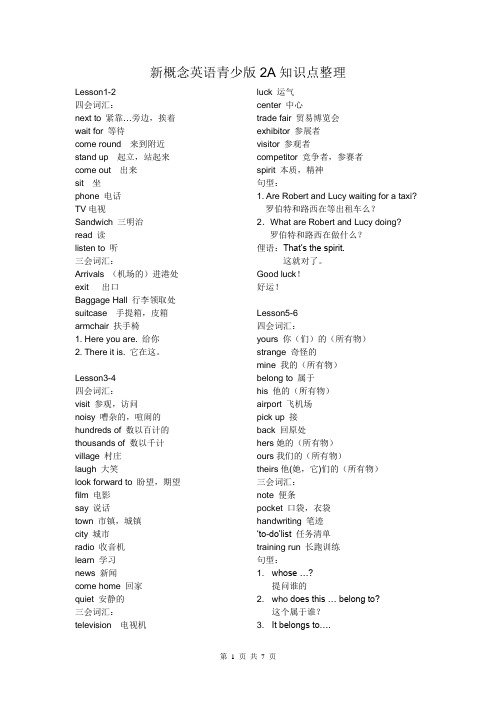
新概念英语青少版2A知识点整理Lesson1-2四会词汇:next to 紧靠…旁边,挨着wait for 等待come round 来到附近stand up 起立,站起来come out 出来sit 坐phone 电话TV电视Sandwich 三明治read 读listen to 听三会词汇:Arrivals (机场的)进港处exit 出口Baggage Hall 行李领取处suitcase 手提箱,皮箱armchair 扶手椅1. Here you are. 给你2. There it is. 它在这。
Lesson3-4四会词汇:visit 参观,访问noisy 嘈杂的,喧闹的hundreds of 数以百计的thousands of 数以千计village 村庄laugh 大笑look forward to 盼望,期望film 电影say 说话town 市镇,城镇city 城市radio 收音机learn 学习news 新闻come home 回家quiet 安静的三会词汇:television 电视机luck 运气center 中心trade fair 贸易博览会exhibitor 参展者visitor 参观者competitor 竞争者,参赛者spirit 本质,精神句型:1. Are Robert and Lucy waiting for a taxi? 罗伯特和路西在等出租车么?2.What are Robert and Lucy doing?罗伯特和路西在做什么?俚语:That’s the spirit.这就对了。
Good luck!好运!Lesson5-6四会词汇:yours 你(们)的(所有物)strange 奇怪的mine 我的(所有物)belong to 属于his 他的(所有物)airport 飞机场pick up 接back 回原处hers她的(所有物)ours我们的(所有物)theirs他(她,它)们的(所有物)三会词汇:note 便条pocket 口袋,衣袋handwriting 笔迹‘to-do’list 任务清单training run 长跑训练句型:1. whose …?提问谁的2. who does this … belong to?这个属于谁?3. It belongs to….它属于…1. let sb. do sth.2. give sb. sth. / give sth. to sb.Lesson 7-8四会词汇:hour 小时put on 穿上walk 走take off 脱下turn on 打开turn off 关掉letter 信throw away 扔掉三会词汇top three percent 最好的百分之三volunteer 自愿者Congratulations! 祝贺Well done! 做得很好!foil jacket 保暖夹克hero英雄this way 这边medal 奖章put up 挂起curtain 窗帘take down 拿下picture 图画so 非常pleased 高兴的Best wishes 最美好的祝福句型:1. Are you going to have a drink?你打算去喝些东西么?2. I’m going to have lunch.我打算去吃午餐。
- 1、下载文档前请自行甄别文档内容的完整性,平台不提供额外的编辑、内容补充、找答案等附加服务。
- 2、"仅部分预览"的文档,不可在线预览部分如存在完整性等问题,可反馈申请退款(可完整预览的文档不适用该条件!)。
- 3、如文档侵犯您的权益,请联系客服反馈,我们会尽快为您处理(人工客服工作时间:9:00-18:30)。
新概念2A复习提纲Name:Unit1单词1.进港处Arrivals2.出口exit3. 手提箱suitcase4. 站立stand5.电话phone 6.坐sit 7.等待wait for 8.行李领取厅Baggage Hall 9. 来到附近come round 10.电视TV 11.listen to12.出来come out 13.三明治sandwich 14. 扶手椅armchair 15.站起来stand up 16.读read17.做饭cook 18.捡,摘pick 19.咖啡coffee 20.午饭lunch 21.音乐music 22.花朵flower动词词组1.喝咖啡drink coffee2.摘草莓pick strawberries3.做午饭cook lunch4.读书read a book5.坐在他的扶手椅上sit in his armchair6.和他的妈妈谈话talk to his mother7.等公交车wait for a bus8.吃三明治eat a sandwich9.喝杯咖啡have a cup of coffee 10喝一些茶drink some tea11.在美术学院附近near the art college 12.做晚饭cook dinner 13.一杯酒a glass of wineUnit2单词1.运气lucky2.记者reporter3.中心centre4. 参观visit5.参观visit 6.参观者visitor7.贸易博览会trade fair 8.嘈杂的noisy 9. 数以百计的hundreds of 10.数以千计的thousands of11.参展者exhibitor 12.村庄village 13.大笑laugh 14.竞争者competitor 15.听众listener16.期望look forward to 17.电影film=movie 18.说say 19.城镇town 20.城市city 21.收音机radio22.学习learn 23.新闻news 24.电视television=TV 25.安静的quiet动词词组1.等公交车wait for a bus2.听收音机listen to the radio3.学英语learn English4.外出go out5.吃午饭have lunch6.踢足球play football7.看新闻watch the news8.摘花pick flowers9.看电视watch television=watch TV 10.回家come home关键句型1.这里有数以百计的参展者和数以千计的参观者。
There are hundreds of exhibitors and thousands of visitors here.2.你很期待周日吗?Are you looking forward to Sunday?3.你/你们正在做什么?---What are you doing? ---I’m waiting for a bus.Unit3单词1.你们的yours2.奇怪的strange3.便条note4.口袋pocket5.我的mine6.属于belong to7.笔迹handwriting 8.他的his 9.任务清单‘to-do’list 10.飞机场airport 11.接pick up12.长跑训练training run 13.她的hers 14. 我们的ours 15.她们的theirs 16.手机mobile17.手套gloves 18.房子house 19. 医院hospital 20.大学college 21. 学校school关键句型1. Whose is this ….? —这个…..是谁的?Eg.—Whose is this mobile?It’s_____/It belongs to_____ —它是…..的/它属于…..。
—It’s mine/It belongs to me.2.—Who does this_____ belong to?—这个……属于谁?Eg.—Who does this CD belong to?—It belongs to____./It’s_____. —它属于…/它是……的。
—It belongs to him./It’s his.Unit4单词1.自愿者volunteer2. 祝贺Congratulations !3.小时hour4. 分minute5.星期week6.天day7.月month 8.年year 9.做得很好!Well done! 10.保暖夹克foil jacket 11.穿上put on12.英雄hero 13.走walk 14.这边this way 15.奖章medal 16. 脱下take off 17.打开turn on18.关掉turn off 19.信letter 20.扔掉throw away 21. 挂起put up 22.窗帘curtain 23.非常so24.图画picture 25.高兴的pleased 26.最好的祝愿Best wishes! 27.收音机radio 28.大衣coat关键句型1.Put on your gloves. 戴上你的手套。
2.Take off your coat. 脱下你的外套。
3.Turn on the radio. 打开收音机。
4.Turn off the television/radio/light/music.关掉电视/收音机/灯/音乐.5.Pick up those letters . 捡起那些信件。
6.Throw away that magazine. 扔掉那张杂志。
7.Put up the curtains. 挂起窗帘。
8.Take down that picture. 拿下那张照片。
9.—What is he doing ? 他正在做什么呢?10.—Can you put on your gloves? 你能戴上手套?—He is putting on his gloves.他正在戴手套。
—Yes, of course.是的,当然可以。
Unit5单词1.蚂蚁ant2.网页website3.查阅look up4.地点place5.幸存survive6.星期week7.呼吸breathe 8.开玩笑joke 9.昆虫insect 10.使用use 11.胳膊arm 12.晚上evening13.也,并且also 14.工作work 15.到达arrive 16.准备prepare 17.写write 18.电子邮件E-mail19.去散步go for a walk 20.电话telephone=phone=phone动词词组1.去学校go to school2.去上班go to work3.去购物go shopping4.回家come home5.到家arrive home6.做饭prepare a meal7.听新闻listen to the news8.看电视watch TV9.喝茶have tea 10.做咖啡make coffee 11.去睡觉go to bed 12.去大学go to college13.去散步go for a walk 14.等待wait for 15.在早晨in the morning 16.在下午in the afternoon17.在晚上in the evening 18.在夜晚at night 19.写一些邮件write some E-mails关键句型1. What time is it?= What’s the time? 几点了?2.Why not? 为什么不呢?3.Really?真的吗?4.It doesn’t say . 这儿没说.5.You’re kidding. 你在开玩笑吧。
Unit6单词1.尺寸size2.进入into3.完美的perfect4.脚foot5.穿wear6.衣服clothes7.剧院theatre8.工作work 9.银行经理bank manager 10.休息rest 11.留下stay 12.游泳swim 13.锻炼exercise 14.躺lie 15.乘飞机旅行fly 16.每天every day 17.今天today词组1.乘公交车去学校go to school by bus2.在办公室上班work in the office3.休息have a rest4.拜访朋友visit a friend5.呆在家stay at home6.外出go out7.每天早晨/下午every morning/afternoon8.今天早晨/下午/晚上this morning/afternoon/evening 9. 会见银行经理meet the bank manager关键句子1. You’re looking very elegant today. 你今天看上去很优雅。
2. They’re perfect with your outfit. 这双鞋和你的套装很配。
3. My feet are size five in the morning, and size six in the afternoon. 我的脚在早上是5号,下午是6号。
Unit7单词1.例子example2.努力地hard3.几乎,差不多nearly4.晚地late5.冲,洗rush6.两次twice7.一次once 8.确切的exactly 9.祖母/外祖母grandmother=grandma 10.﹙外﹚祖父母grandparents11.祖父/外祖父grandfather=grandpa 12.两星期fortnight 13.药medicine 14. 海边seaside15.伦敦London 16.浪费时间a waste of time词组1.去电影院go to the cinema2.去剧院go to the theatre3.拜访她的祖母visit her grandmother4.去海边go to the seaside5.吃药take one’s medicine6.上音乐课have a music lesson7.加班work late 8.参观伦敦visit London 9.每周六everySaturday/Month 10.在周一on Monday11.在五月in May 12.一周一次once a week 13.一天三次three times a day 14.饭后after meals关键句子1.Sixteen percent eat breakfast at work. 有16%的人在工作时吃早饭。
